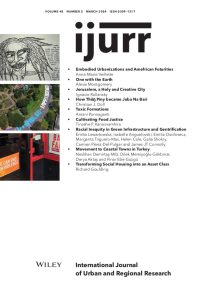In Turkey, as in many Mediterranean countries, the Covid-19 pandemic enhanced the mobility of the country’s affluent classes to coastal towns. Many decided to settle there permanently, either by making their second homes their main residences, or by purchasing or renting new property. This has created severe social, infrastructural and environmental problems in these towns because of transformed demographics, a largely unregulated construction boom, increased renovation activities and an unprecedented rise in real-estate and consumer-goods prices. In this article we contextualize these problems in relation to the Justice and Development Party’s neoliberal policies of urban governance and rescaling in the past 15 years. The government, having given the construction sector the main role in Turkey’s economic development, subsequently granted it new spatial opportunities through the authoritarian and centralized allocation of urban and rural land. Coastal towns have been the target of unregulated urban growth and predatory construction in this process and have thus provided new spatial development prospects. Local governmental reform in 2012, which introduced radical urban rescaling and weakened district municipalities’ planning and regulation capacities, further intensified the process. These factors have had a severe impact on coastal towns and their middle-income residents, who face new mobility pressures.
Details
Written by:
Neslihan Demirtaş-Milz, Dilek Memişoğlu-Gökbinar, Derya Aktaş & Pinar Ebe-Güzgü
Digital Object Identifier (DOI)
https://doi.org/10.1111/1468-2427.13229
About DOI

